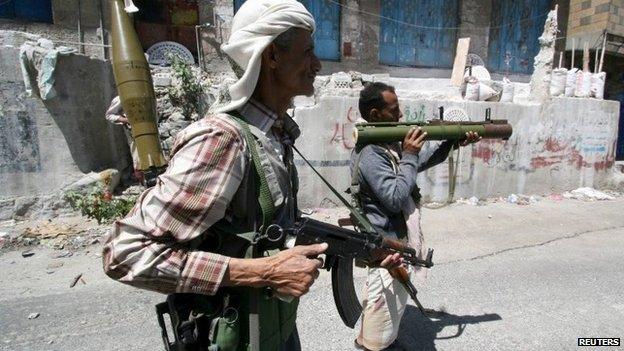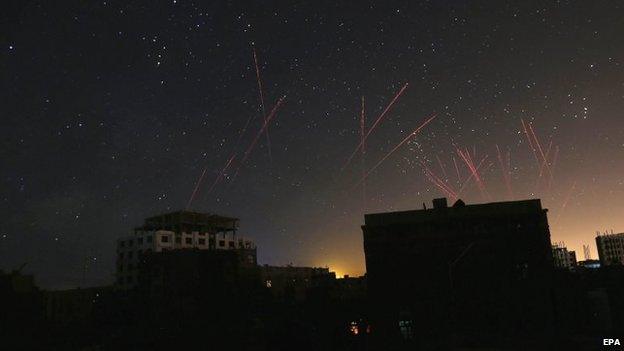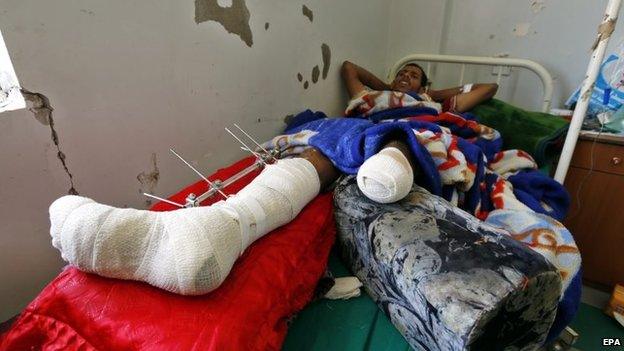Yemen conflict: Saudi-led coalition resumes air strikes
- Published

Fighting between militiamen loyal to the government and the rebels continues to rage
Saudi-led coalition jets have bombed Houthi rebels in Yemen's third city of Taiz, hours after announcing the end of a military campaign against them.
The strikes followed the fall of the base outside Taiz of an army unit loyal to President Abdrabbuh Mansour Hadi.
Fighting was also reported in the second city of Aden, Lahj's provincial capital Huta, and the town of Daleh.
On Tuesday, Riyadh declared its month-long campaign, which sought to restore the president, had achieved its goals.
But it warned that it would continue to take action against the Houthis as needed.
More work "needs to be done" in Yemen, US White House spokeswoman Jen Psaki told CNN, while emphasising the need for a negotiated solution.
On Wednesday the Houthi rebels asked for the coalition action to end and for UN-sponsored peace talks.
The UN says at least 944 people have been killed and 3,487 injured in air strikes, fighting on the ground and attacks by jihadist militants in Yemen since 19 March.
Jeremy Bowen reports from the border between Saudi Arabia and Yemen
'Broken promise'
Rebel fighters took control of the headquarters of the 35th Armoured Brigade on the northern outskirts of Taiz early on Wednesday.
An army officer told the AFP news agency that dozens of people were killed or wounded in the heavy fighting, and that shortly after the takeover coalition aircraft targeted rebel forces inside the base.

They also bombed a gathering of rebels and allied military personnel loyal to ousted former President Ali Abdullah Saleh near the city's central prison, he added.
The 35th Brigade is loyal to President Hadi, who fled the country March as the Houthis and their allies advanced on Aden in March.
Also on Wednesday, Yemeni officials said a strike from what is believed to have been a US drone killed seven al-Qaeda fighters in the east.
Correspondents say that Al Qaeda appears to have taken advantage of the current chaos in Yemen to consolidate its presence in the southeast.

Analysis: Jeremy Bowen, BBC Middle East editor, Jeddah
It was not surprising when the Saudis said that they had resumed air strikes against Houthi fighters in Taiz.
Negotiations are under way to try to find a way to stop the fighting in Yemen. But the Houthis have fought hard to reach their dominant position in Yemen, and will not give up easily.
On 14 April, the UN Security Council passed a resolution that made clear demands on the Houthis. Among other things it calls on them to give up their weapons and the territory they have seized, which includes Yemen's capital, Sanaa.
The Saudis say that they are trying to get the Houthis to comply with as much of the resolution as possible. But if and when an agreement is brokered, the chances are that it will be hard to make it stick.

The president took refuge in the southern port city of Aden after the rebels took full control of the capital Sanaa and placed him under house arrest.
Saudi diplomatic sources told BBC Middle East editor Jeremy Bowen, who is in Jeddah, that the air strikes had resumed because the Houthis "broke a promise" in Taiz.
The Saudis and their coalition partners reserved the right to use air power again when they announced the end of "Operation Decisive Storm" on Tuesday.

Saudi Arabia said its aircraft would continue to target the rebels as necessary

The UN has expressed concern about the number of civilian casualties
A new, more limited campaign, "Operation Restoring Hope", would focus on preventing the rebels from "targeting civilians or changing realities on the ground" and finding a political solution the conflict, spokesman Brig Gen Assiri said.
The Saudi diplomatic sources said an agreement was being finalised with the Houthis.
In an apparent gesture of goodwill on Wednesday, the Houthis released Defence Minister Mahmoud al-Subaih, the brother of President Hadi and a military commander, rebel and tribal sources said. The three men had been held for nearly a month.
As Orla Guerin reports, the streets of Aden are a dangerous place
Former President Saleh has also urged all sides to "return to dialogue to solve and treat all the issues".
Iran, which denies providing military assistance to the rebels, described the Saudi decision as a positive development and called for peace talks.
But Pro-Hadi militiamen in southern Yemen declared they would continue fighting the rebels until they had driven them out of the region.